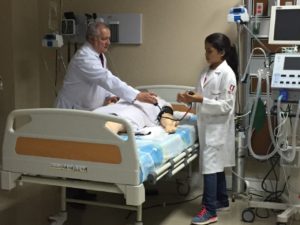
Guayaquil, Ecuador, Mar 4 (EFE).- The Ecuadorian Education Ministry must resolve the unusual case of a super-gifted 12-year-old girl who has just completed a pre-university medical curriculum and wants to move on to medical school, despite the fact that technically she has not even finished elementary school.
Maite Pazmiño, born in Guayaquil, studied at the city’s Espiritu Santo University thanks fo Dr. Jose Barberan, who after receiving her school records decided to award her one of the coveted spots in the medical school.
“I didn’t know that she was 12. When I saw her with her mom I thought that it was the mother who was coming to study medicine,” said Barberan in an interview with EFE.
Into his office, filled with recognition certificates presented to him by the school over his years of service there, came a girl who only wanted to demonstrate her abilities and skip six years of primary and secondary school study.
Maite’s case is not the norm in Ecuador, but there is at least one precedent: the case of Daniel Honciuc, who – at age 11 – is in his second year of his B.A. in Quito and since 2015 has been studying advanced courses online through US universities.
Maite’s outstanding abilities were noticed at age 4, when her parents saw that she already knew how to read and write.
Already at that time, she was able to score in the 99th percentile on the Raven non-verbal reasoning tests and 144 points (with the average range being 90-109) on the Wechsler psychometric test which evaluates verbal comprehension, perceptive reasoning, memory and thinking speed.
“A teacher at her school told us that she should take the exams,” Maite’s mother, 37-year-old homemaker Gabriela Minuche told EFE, adding that she has spent the past two months accompanying her daughter to the university and telling EFE of those years during which she herself aspired to study medicine, a career that she never completed her training for because she became pregnant.
Maite’s father, 46, is the manager of a cacao company and she has three brothers, ages 2, 5 and 7, all of whom have advanced abilities.
Maite, who speaks English, German and Spanish, is studying at Guayaquil’s Humboldt school, an institution that – she says – she wants to leave because “I’m bored. They don’t have anything to offer me.”
She decided upon the pre-med course of study when she sent an e-mail to Dr. Barberan without revealing her age so that she would not be automatically rejected.
At their meeting, she gave him her online course certificates for the University of Australia and Harvard and asked him to admit her despite her young age.
“She had been asking to go (to the school) for two years, but I stopped her because she seemed very young to me,” said Gabriela, defending Maite’s desire not to return to her regular school.
“When I was … in nursery school I wanted to be a paleontologist, but I began to become interested in medicine and now I’m sure that that’s what I want to study,” said Maite, who is used to studying with classmates who are seven or eight years older than she is.
Apart from studying the sciences, she likes to act and on the weekends she teaches her younger brothers how to draw.
Although her case is not the only one in Ecuador, the country’s educational authorities are not prepared to provide an answer to the family regarding her admission to medical school because technically a person cannot enter the university without a high school diploma.
“This kind of talent exists in Ecuador with a certain frequency. Unfortunately, it is not identified in time or it’s not provided with the support to develop it,” Barberan said, adding – nevertheless – that he would prefer for Maite to graduate from high school before accepting her as a med student.
The Education Ministry must now examine the case and decide if it will exempt Maite from the rest of her primary and secondary studies or obligate her to finish that curriculum before she can move on to higher educational endeavors.
